Anxiety
Drugs to Treat Anxiety Disorder
Drugs to Treat Anxiety Disorder
Anxiety disorder has no cure, but doctors can treat it. Collaborate with your doctor to determine the best treatment plan for you. The below are some drugs to treat Anxiety disorder.
Xanax carries boxed warnings, the most serious alerts from the Food and Drug Administration (FDA). These warnings inform doctors and patients about potentially dangerous drug effects.
Taking benzodiazepines, even as directed, can result in physical dependence and withdrawal if the drug is abruptly stopped. Withdrawal poses life-threatening risks. Benzodiazepines are drugs to treat Anxiety disorder.
Benzodiazepine use can also lead to misuse and addiction, increasing the risk of overdose and death.
Only use these drugs as prescribed by your doctor. Discuss any concerns about safely using benzodiazepines with your healthcare professional.
About treatment
Most people experience anxiety at some point in their lives, and often, the feeling resolves on its own. However, anxiety disorder presents differently. If you’ve received a diagnosis, you might require assistance in handling your anxiety. Treatment usually involves psychotherapy and medication.
Although medications don’t cure anxiety, they can assist in symptom management, enabling you to function effectively and improve your daily life.
Various medications exist, and due to individual differences, you and your doctor may need to experiment with several before finding the most suitable one for you.
Benzodiazepines
Benzodiazepines, such as alprazolam (Xanax), chlordiazepoxide (Librium), clonazepam (Klonopin), diazepam (Valium), and lorazepam (Ativan), function as sedatives, aiding in muscle relaxation and mind calming by amplifying the effects of specific neurotransmitters. These neurotransmitters serve as messengers between brain cells.
Moreover, benzodiazepines play a pivotal role in treating various anxiety disorders, encompassing panic disorder, generalized anxiety disorder, and social anxiety disorder.
Examples of these drugs include:
- alprazolam (Xanax)
- chlordiazepoxide (Librium)
- clonazepam (Klonopin)
- diazepam (Valium)
- lorazepam (Ativan)
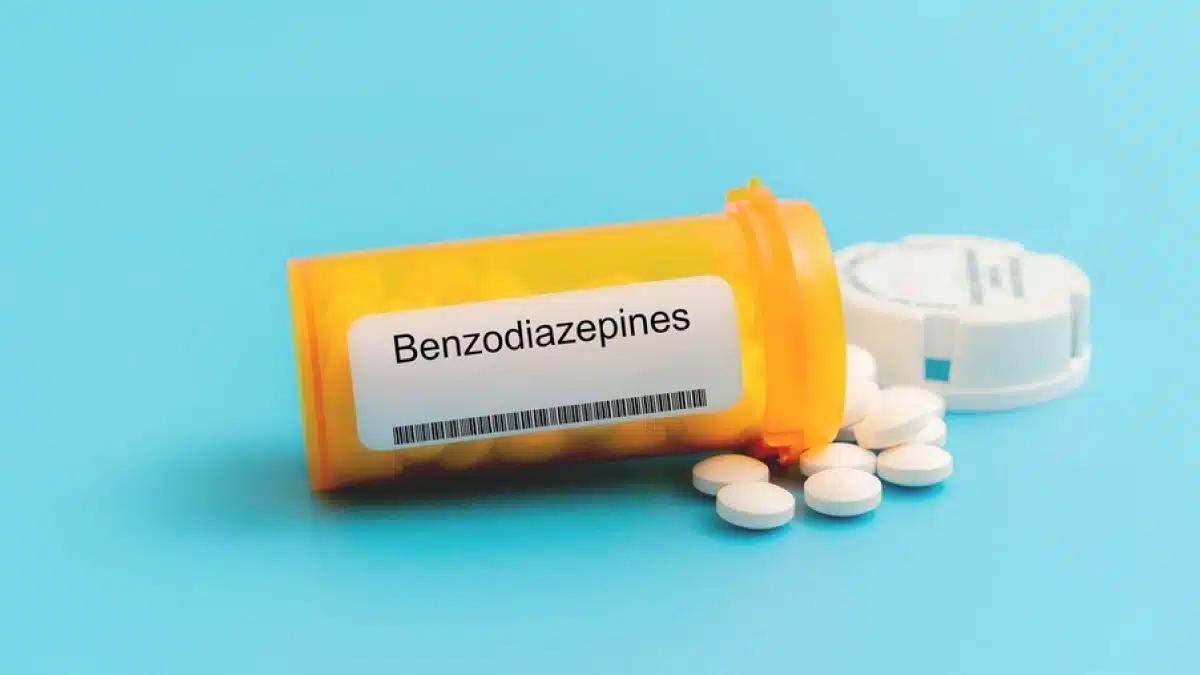
Benzodiazepines are commonly employed for short-term anxiety treatment due to their potential to induce drowsiness, impair balance and memory, and foster dependence. Moreover, there is a growing number of cases of substance use disorder associated with benzodiazepines.
It’s crucial to limit the use of these drugs until your doctor recommends alternative treatment. However, individuals with panic disorder may receive benzodiazepine prescriptions for up to 1 year.
Side effects
In addition to drowsiness and memory problems, taking benzodiazepines can also cause:
- confusion
- vision problems
- headaches
- feelings of depression
If you’ve been regularly taking a benzodiazepine for over 2 weeks, it’s crucial not to abruptly stop the medication, as this could trigger unwanted withdrawal symptoms. Instead, discuss gradually reducing your dosage with your doctor to lower the risk of seizures.
Buspirone
Buspirone treats both short-term and chronic (long-lasting) anxiety disorders. Although the exact mechanism is not fully understood, it’s believed to impact brain chemicals that regulate mood.
It may take several weeks for buspirone to reach its full effectiveness. It’s available both as a generic drug and under the brand name Buspar.
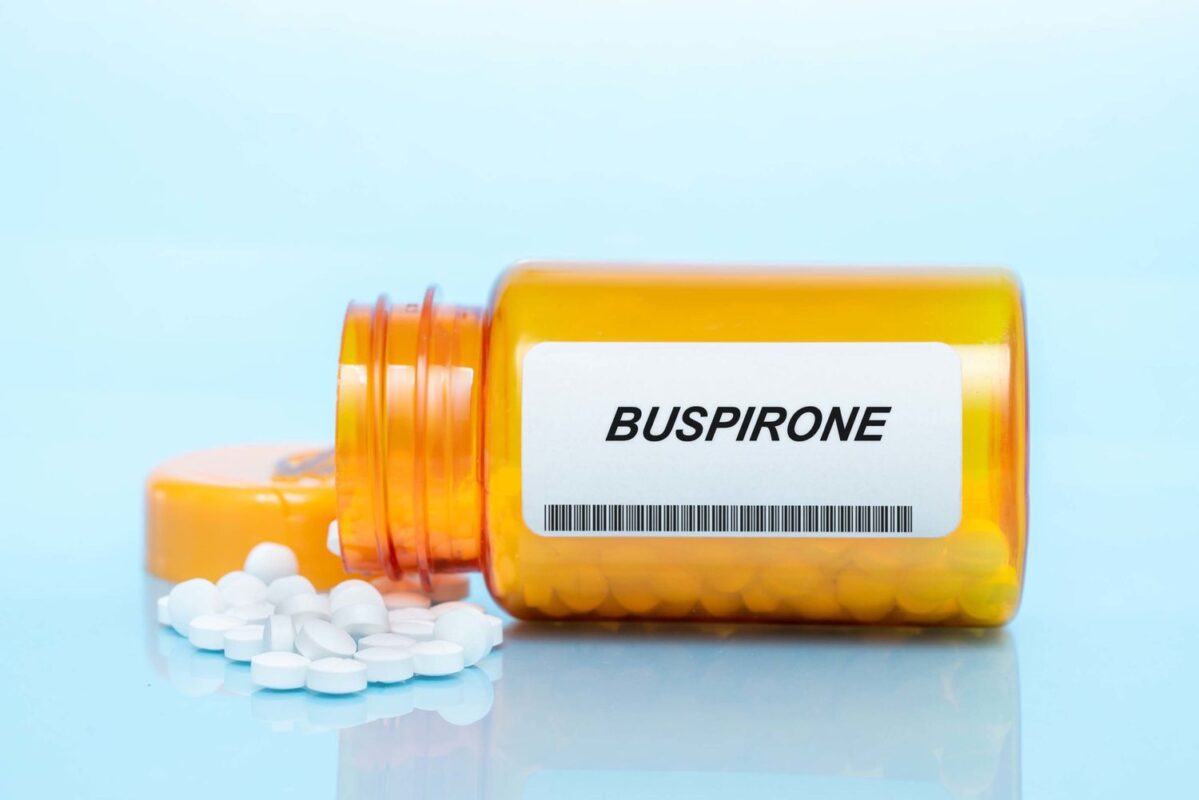
Side effects
Side effects of buspirone can include dizziness, headaches, and nausea. Additionally, some individuals may experience strange dreams or difficulty sleeping while taking the medication.
Antidepressants
Antidepressant medications impact neurotransmitters to alleviate symptoms of anxiety. While they can be utilized for treating anxiety, it typically takes 4 to 6 weeks before noticeable effects occur.
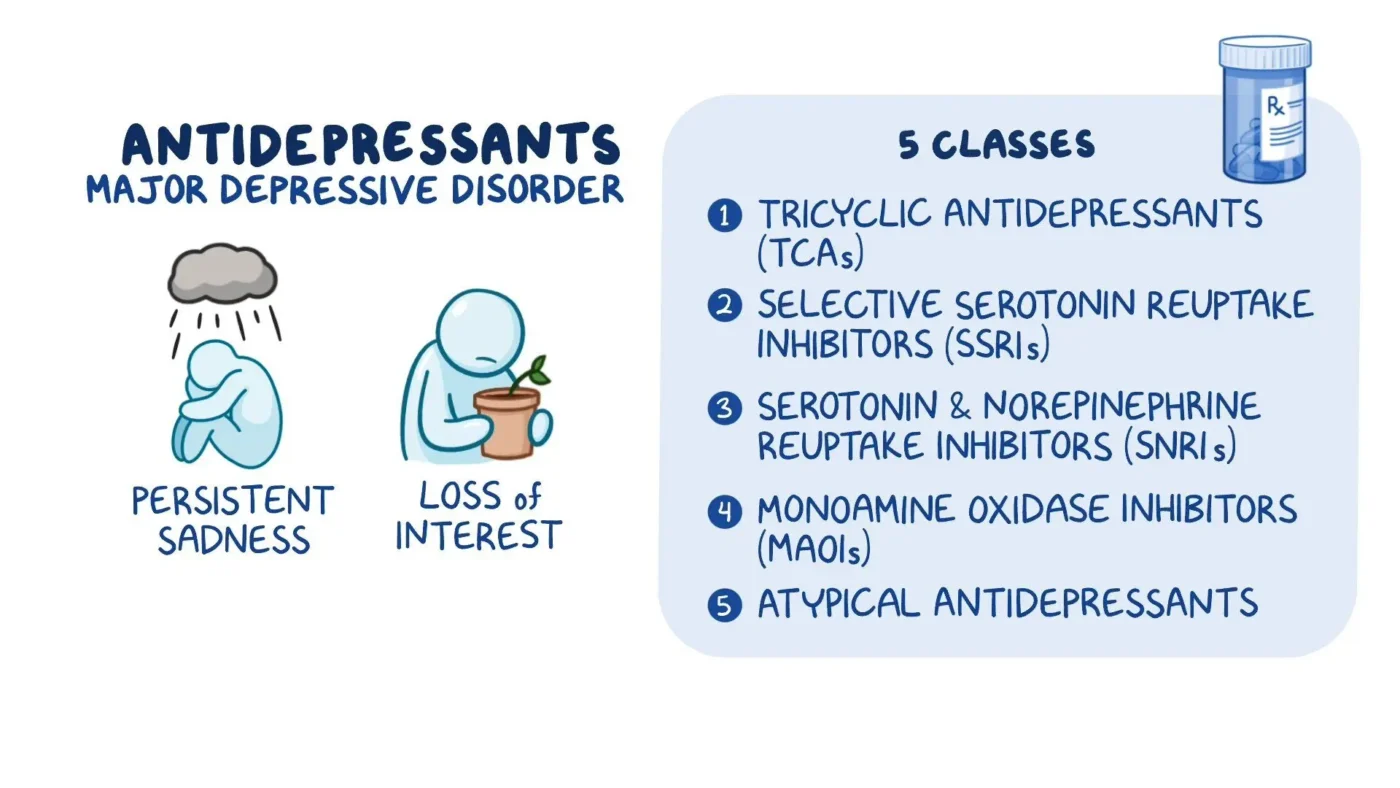
Types of antidepressants include:
SSRIs
Selective serotonin reuptake inhibitors (SSRIs) work by increasing levels of serotonin, a neurotransmitter that affects mood, sexual desire, appetite, sleep, and memory. SSRIs are typically started at a low dose that your doctor gradually increases.
Examples of SSRIs used to treat anxiety include:
- escitalopram (Lexapro)
- fluoxetine (Prozac)
- paroxetine (Paxil)
- sertraline (Zoloft)
Side effects
SSRIs can cause a variety of side effects, but most people tolerate them well. Side effects can include:
- nausea
- dry mouth
- muscle weakness
- diarrhea
- dizziness
- drowsiness
- sexual dysfunction
If you have a concern about a particular side effect, talk with your doctor.
Tricyclics
Tricyclics work as well as SSRIs do for treating most anxiety disorders, except obsessive-compulsive disorder (OCD). It’s thought that tricyclics work similarly to SSRIs. Like SSRIs, tricyclics are started at a low dose and then increased gradually.
Examples of tricyclics used for anxiety include:
- clomipramine (Anafranil)
- imipramine (Tofranil)
Tricyclics are older drugs that are used less often because newer drugs cause fewer side effects.
Side effects
Side effects associated with tricyclics include dizziness, drowsiness, confusion, urinary retention, nausea and vomiting, constipation, blurred vision, and weight gain. Adjusting the dosage or switching to another tricyclic medication can often help manage these side effects.
MAOIs
Doctors use Monoamine oxidase inhibitors (MAOIs) to treat panic disorder and social phobia. These medications function by boosting the levels of neurotransmitters responsible for mood regulation.
MAOIs that are FDA approved to treat depression but used off-label for anxiety include:
- isocarboxazid (Marplan)
- phenelzine (Nardil)
- selegiline (Emsam)
- tranylcypromine (Parnate)
Side effects
Like tricyclics, MAOIs are older drugs that cause more side effects than newer drugs. Some side effects include:
- dry mouth
- nausea
- diarrhea
- constipation
- drowsiness
- insomnia
- dizziness
Several medications, including SSRIs, certain birth control pills, pain relievers like acetaminophen and ibuprofen, as well as cold and allergy medications, along with herbal supplements, can interact with MAOIs. Combining an MAOI with these medications can significantly raise blood pressure and lead to other potentially life-threatening side effects.
Beta-blockers
Beta-blockers primarily treat heart conditions but are also utilized off-label to alleviate the physical symptoms of anxiety, particularly in social anxiety disorder.
In stressful situations like attending a party or giving a speech, your doctor might prescribe a beta-blocker such as propranolol (Inderal) to help diminish your anxiety symptoms.
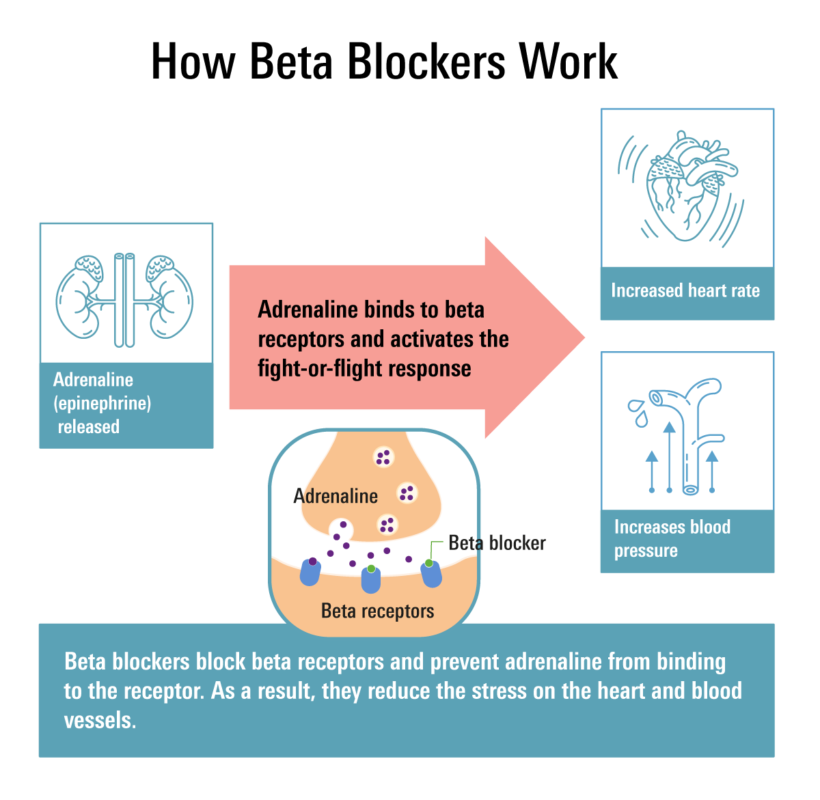
Side effects
Beta-blockers don’t usually cause side effects in everyone taking them.
Some potential side effects can include:
- fatigue
- dizziness
- drowsiness
- cold fingers or toes
Other side effects may include:
- trouble sleeping
- nausea
- shortness of breath
Home remedies for anxiety
A variety of at-home interventions exist to help alleviate your anxiety symptoms. Additionally, several interventions can be practiced alongside medication use.
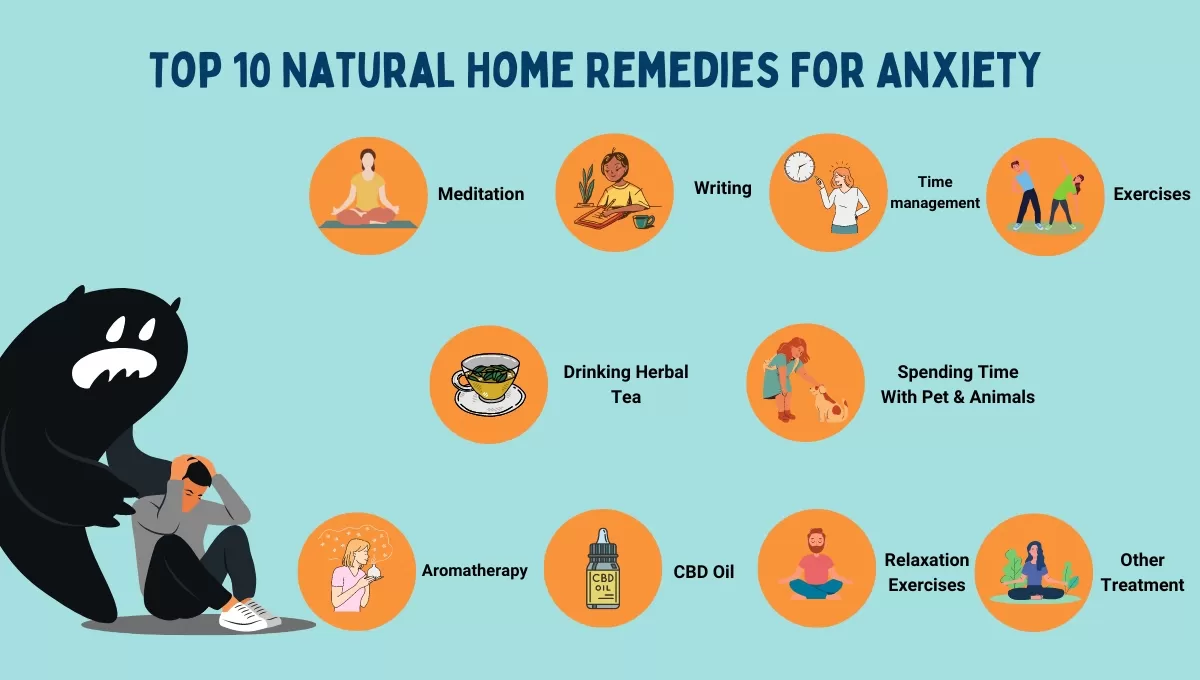
Examples of these interventions include:
Exercise
According to the Anxiety and Depression Association of America (ADAA), exercise can assist in stress reduction and enhance overall well-being. It facilitates the production of neurotransmitters called endorphins, which act as natural pain relievers and can improve sleep quality. The ADAA further notes that even brief exercise sessions (approximately 10 minutes each) are effective in elevating mood.
Meditate
Engaging in 15-minute intervals of quiet time and meditation, where you focus on deep breathing and relaxation, can effectively calm your anxiety. Consider incorporating activities such as listening to music or repeating a motivational mantra into your routine.
Try chamomile
Sipping chamomile tea or taking a chamomile supplement might help ease anxiety symptoms. A 2016 double-blind study published in the Phytomedicine journal examined individuals with generalized anxiety disorder. The study revealed that participants who consumed 500-milligram chamomile supplements three times per day reported a reduction in moderate to severe generalized anxiety.
Drinking chamomile tea has also been shown to help reduce anxiety.
Smell aromatherapy oils
Smelling diluted aromatherapy oils may help reduce anxiety, according to an article published in the Evidence-Based Complementary and Alternative Medicine journal.
Examples of essential oils used to provide anxiety relief include:
- lavender
- neroli
- chamomile
Avoid caffeine
Sometimes caffeine may make you feel jittery and more anxious. Avoiding it can help some people reduce their anxiety.
Talk with your doctor
Your doctor can assist you in determining the optimal treatment plan for your anxiety. Typically, effective treatment involves a combination of psychotherapy and medication.
Ensure you adhere to your doctor’s instructions when taking anxiety medications and inform them promptly of any side effects you experience.
Also, ask any questions you have about your condition or your treatment, such as:
- What side effects could I have from this medication?
- How long will it take to start working?
- Does this medication interact with any other drugs I’m taking?
- Can you refer me to a psychotherapist?
- Could exercise help relieve my anxiety symptoms?
If you feel a medication isn’t giving you the desired results or is causing unwanted side effects, talk with your doctor before you stop taking it.
